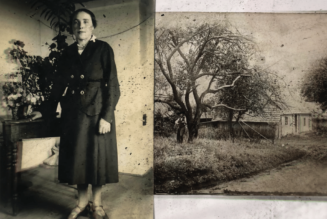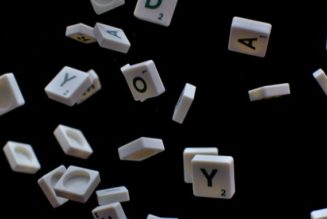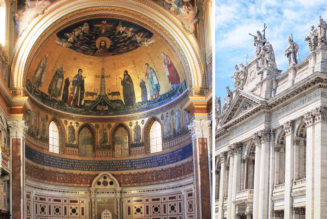
The first reading from Monday’s Mass (Monday of the 5th Week of Lent) is the story of Susanna, an extraordinary moral tale from the Book of Daniel. The full passage (which is quite lengthy) can be found here: Daniel 13:1-62. Interestingly, it is missing from Protestant bibles, which use a truncated version of the Book of Daniel. It is not well-known among Catholics, either, because it is only read once each year, at a weekday Mass.
The story is of a beautiful young woman, Susanna, who is married to a man named Joakim. One day as she is bathing in a private garden, two older men who have hidden themselves there try to seduce her. When Susanna rebuffs their brazen overture, they threaten to falsely accuse her of having committed adultery with a young man in the garden if she does not submit to their desires. She still refuses and they follow through with their threat, even demanding that she be stoned. Things look bleak for Susanna until Daniel comes to the rescue; through crafty interrogation he exposes their lie. The story is a small masterpiece; if you have never read it, I recommend you do so.
In the course of this engaging tale is a lesson on the anatomy of a sin. In a remarkable description, the story describes three sources from which their sin springs. The text says, They suppressed their consciences; they would not allow their eyes to look to heaven, and did not keep in mind just judgments (Daniel 13:9). I’d like to take a look at each of these three sources in turn.
1. They suppressed their consciences.What is the conscience? The Catechism puts it in this way: Deep within his conscience man discovers a law which he has not laid upon himself but which he must obey. Its voice, ever calling him to love and to do what is good and to avoid evil, sounds in his heart at the right moment. … For man has in his heart a law inscribed by God. … His conscience is man’s most secret core and his sanctuary. There he is alone with God whose voice echoes in his depths (Catechism of the Catholic Church (CCC) # 1776). In effect, the conscience is the voice of God within us. God has written His Law in the heart of every human person.
We have a basic understanding of right and wrong; we know what we are doing. There may be certain higher matters of the Law that the conscience must be taught (e.g., the following of certain rituals or feasts days), but in terms of fundamental moral norms, we have a basic, innate grasp of right and wrong. We see and salute virtues like bravery, self-control, and generosity; we also know that things such as the murder of the innocent, promiscuity, and theft are wrong. For all the excuses we like to make, deep down inside we know what we are doing and we know that we know what we are doing. I have written substantially about conscience here.
Notice that the text says that they “suppressed their consciences.” Even though we know something is wrong we often want to do it anyway. One of the first things our wily mind will do is to try to suppress our conscience.
The usual way of doing this is through rationalizations and sophistry. We invent any number of thoughts, lies, and distortions to try to reassure ourselves that something is really OK—something that deep down inside we know is not OK.
We also accumulate false teachers and teachings to assist in this suppression of the truth. St. Paul wrote to Timothy, For the time will come when men will not put up with sound doctrine. Instead, to suit their own desires, they will gather around them a great number of teachers to say what their itching ears want to hear. They will turn their ears away from the truth and turn aside to myths (2 Tim 4:1-3).
Suppressing one’s conscience takes quite a bit of effort, and I would argue that one cannot ever do it completely. In fact, the whole attempt to suppress the conscience is not only a substantial effort, but also very fragile. This helps to explain the anger and hostility of many in the world toward the Church. Deep down they know that we are right. Often, even the slightest appeal to the conscience awakens its voice, causing an eruption of fear and anger.
So this is the first stage in the anatomy of a sin: the suppression of the conscience. In order to act wickedly without facing the deep psychological pain of significant guilt, the men in the story suppress the conscience in order to shut off the source of that pain.
2… they would not allow their eyes to look to heaven … – In order to sustain the rationalizations and sophistry necessary to suppress the conscience, one must distance oneself from the very source of conscience: God Himself.
One way to do this is to drift away from God through neglect of prayer, worship, study of the Word of God, and association with the Church, which speaks for God. As time goes own, this drifting may increase and the refusal to repent become more adamant. Drifting can finally lead to absence, which often manifests as outright hostility to anything religious or biblical.
Another way that some avert their eyes from Heaven is by redefining God. The revealed God of Scripture is replaced by a “designer God,” who does not care about this thing or that. “God doesn’t care whether or not I go to church, or if I shack up with my girlfriend.” On being shown Scripture contrary to their distorted notions, they often respond that St. Paul had “hang-ups” or that the Bible was written in primitive times.
Culturally, the refusal to look heavenward is manifest in the increasing hostility to the Catholic Christian faith. Demands that anything even remotely connected to the faith be removed from the public square are becoming increasingly strident. According to radical secularists, prayer in public, nativity sets, Church bells, any reference to Jesus or Scripture, etc. must all be removed; they refuse to turn their eyes heavenward or even have anything around that reminds them to do so.
The cumulative effect is that many people are no longer looking to Heaven or to God. Having suppressed their consciences, they now demand a public square absent any reference to God. Still others reinvent a fake God, a false kingdom, an idol. Either way, the purpose is to isolate and insulate the self from God and what He reveals. This makes it easier to maintain the rather exhausting effort of suppressing the conscience.
3… and did not keep in mind just judgment. Finally let’s throw in a little presumption that dismisses the consequences of evil acts. This, of course, is one of the biggest sins of our current age. There are countless people, even among Catholics in the pews and Catholic clergy, who seem to deny that they will ever have to answer to God for what they have done. This is completely contrary to Scripture, which insists that we will indeed answer one day to God for our actions.
This final stage is meant to eliminate the salutary fear that should accompany evil acts. At this stage, the sinner has had some success in alleviating the psychic pain of guilt and in eliminating a lot of the fear that used to accompany sin.
However, even after suppressing the conscience and refusing Heaven’s influence, some fear still remains. Now, an attack is made on any notion of consequences. Perhaps the sinner exaggerates the mercy and patience of God to the exclusion of His holiness, which sin cannot endure. Perhaps he denies the reality of Hell, which God clearly teaches. Perhaps he denies that God exists at all and thus holds that there is no judgment to be faced. Regardless of how he does it, the sinner must push back the fear the punishment and/or judgment.
Here, then is the anatomy of a sin. Having suppressed the conscience, having muted the voice of God to the extent possible and removed oneself from Heaven’s influence, and finally having denied that any negative consequences will ensue, one feels freer to sin. It is as though one has taken a number of stiff drinks to anesthetized oneself sufficiently to proceed.
Guess what, though, the pain is still there, deep down inside. The voice of conscience remains. Despite all the attempts to insulate himself from the true God, deep down the sinner still knows that what he is doing is wrong. Even the slightest thing that pricks his conscience causes unease. Increasingly, he resorts to anger, projection, name-calling, and/or ridiculing of anyone or anything that awaken his conscience. Sin is in full bloom now; repentance seems increasingly difficult and unlikely. Only the prayers and fasting of others for his sake will likely spring him loose from his deep moral sleep. Pray for the conversion of sinners!
Well, because this post has been a little heavy it, I’d like end on a lighter note:









